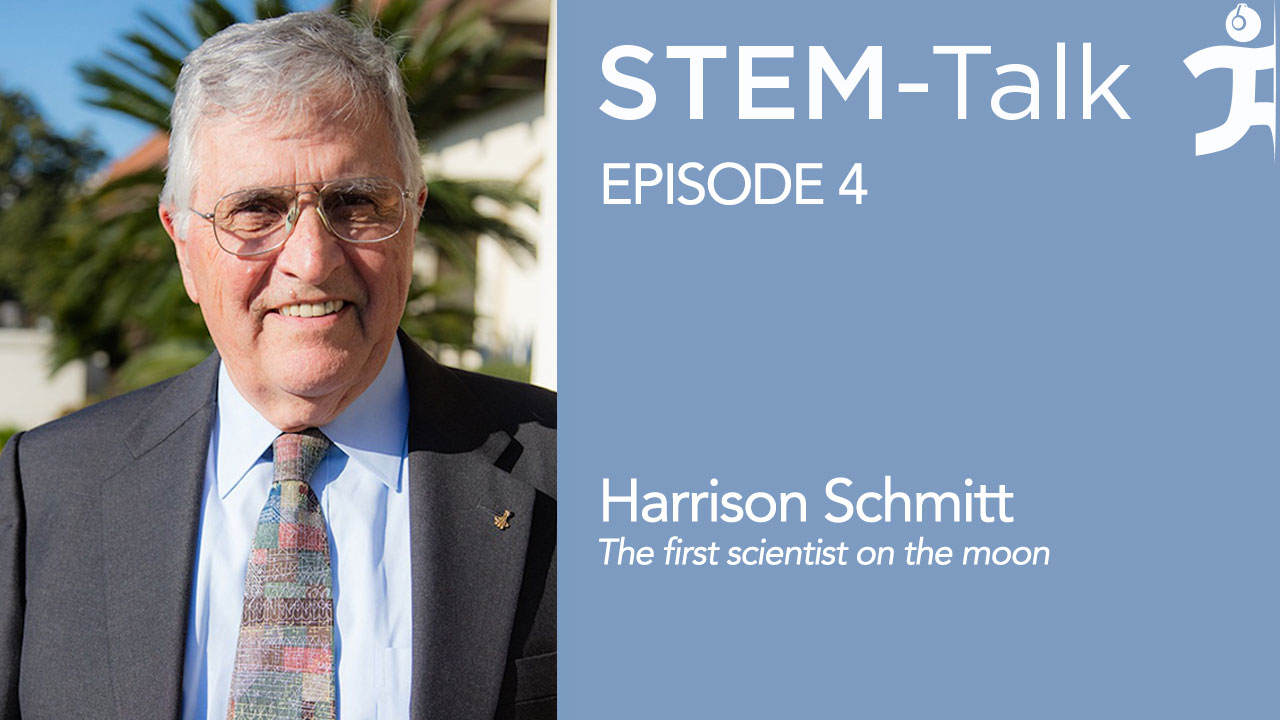STEM-Talk
Episode 4: Harrison Schmitt discusses being the first scientist on the moon
// Mar 22, 2016

In this episode, we talk with Harrison “Jack” Schmitt, the first and only scientist to land on the moon. Schmitt was part of the Apollo 17 Mission in 1972, the last Apollo mission.
The geologist turned NASA Astronaut, turned U.S. senator, talks about first seeing the advertisement, in 1964, for scientists interested in space missions. “When I saw that on the bulletin board, I hesitated about ten seconds,” he said.
Called “Dr. Rock” by his colleagues in the Apollo program, Schmitt recounts walking, falling and singing on the moon; and his discovery of orange ash, probably of volcanic in origin at Shorty Crater.
Schmitt says returning to the moon is a gateway to Mars, and that private investors may have a stake in funding future space exploration.
Schmitt recently lectured at IHMC; view his lecture on youtube. Check out his book, “Return to the Moon,” on Amazon.
STEM-Talk’s host Dawn Kernagis and co-host Tom Jones, a veteran NASA astronaut himself, talk to Schmitt.
3:53: Historic audio tape of Schmitt throwing geologist’s hammer on the moon.
5:11: Historic audio tape of Schmitt and Gene Cernan singing on the moon.
6:00: Historic audio tape of Schmitt discovering orange soil on the moon.
7:12: Jack excitedly reports from the Moon that he could see ‘orange soil’ on the rim of Shorty Crater in the Taurus-Littrow Valley. When the samples were returned to Earth, they were shown to consist of millions of very small brown-orange glass spheres. These are now thought to represent pyroclastic volcanic activity (“fire fountains”) that occurred about 3.5 billion years ago.
9:39: Schmitt’s parents inspired his interest in science from an early age. His father was an economic geologist who studied ore deposits, and his mother had an interest in botany and ornithology.
12:57: Schmitt’s thoughts on his selection as the first and only science to go to the moon.
15:31: Schmitt describes right before take-off, monitoring gauges in cabin; “becoming competitive with flight controllers” in Houston.
19:12: Schmitt says thoughts of mortality did not go through his mind pre-launch. What was he thinking? “You don’t want to recycle. That means another month of training.”
20:41: Schmitt describes first impressions of the moon: “spectacular mountains.”
22:27: Marvels at the mountains on either side: 1,600-2,100 meters above surface, which is higher than the depth of the Grand Canyon. Also notes tracks of boulders rolling down mountain.
24:30: Apollo 17 flight controllers used to call Dr. Schmitt “Dr. Rock.”
25:31: Schmitt spent his free time reading operations manual to be “the best lunar module pilot.”
27:11: Historic audio footage of Schmitt saying “dad-gummit” on the moon.
28:57: Schmitt says the Apollo A7LB spacesuit was a remarkable development. Water-cooled underwear allowed the team to control body temperature long enough for explorations.
30:38: Schmitt discusses samples from Apollo 17 mission: “The samples are the gift that keeps on giving.”
32:56: Apollo 17’s most important result: “an understanding of the early history of the earth.”
33:44: Earth’s early history was “extraordinarily violent.” Complex molecular evolution that led to life was taking place.
34:33: Schmitt believes that the moon was formed (by accretion) near earth’s orbit — not by a Mars-sized object impacting the Earth.
36:09: The orange volcanic ash found on the moon makes it unlikely that the moon was formed by a giant impact. Schmitt calls it the most important finding from Apollo 17.
38:29: Commercial break: Commercial break: STEM-Talk is an educational service of the Florida Institute for Human and Machine Cognition, a not-for-profit research lab pioneering ground-breaking technologies aimed at leveraging human cognition, perception, locomotion and resilience.
39:00: Jack answers the question, “why return to the Moon?” To mine it as a reservoir of isotopic helium. And, “It’s the fastest way to Mars.”
41:25: “It’s going to take at least two generations of men and women to get us to Mars.” It’s a much higher-risk environment than the near-earth orbit.
42:56: “If I were to make make one recommendation on what it’s going to take to get us to Mars, it’s an agency that can stay young.” Cites Navy as an example of recruiting and keeping young generations.
44:24: “The initial decision to limit the Apollo program was made in the Johnson Administration.” It was a budgetary decision to only buy ten Saturn Vs, “the true enabling technology for working in deep space.”
47:14: Schmitt explains why the moon is a good source of Helium-3: Because of its lack of lunar atmosphere. “It’s [Helium-3] not abundant, but it’s so valuable in terms of its energy content, that the economics I think begin to make sense.”
49:34: Describes role of robotic explorers on moon in pre-planning human exploration and in follow-up.
51:10: Schmitt says robot field assistant “might get in the way”—at least more so than a graduate student.
53:52: “A settlement on the moon is quite doable,” Schmitt says. And carries potential economic benefit.
55:00: Current political leadership does not understand geopolitical importance of being a leader in space exploration.
56:20: “We had a lot of things going for us in pre-Apollo days,” Schmitt says: political leadership, young Sputnik generation; an adequate technology base; the geopolitical challenge of the Cold War.
58:00: Commercial break: STEM-Talk is an educational service of the Florida Institute for Human and Machine Cognition, a not-for-profit research lab pioneering ground-breaking technologies aimed at leveraging human cognition, perception, locomotion and resilience.
58:36: Schmitt discusses books that formed him, from childhood through present day. History books were especially influential.
1:01:09: Schmitt’s own book project: re-casting a diary of Apollo 17, along with insights garnered from that mission in past 43 years.
1:02:50: Schmitt advises future explorers/scientists to “read a little bit of history everyday…. Including the history of exploration. “It is important to understand what has motivated people to explore if you want to be an explorer yourself.”






